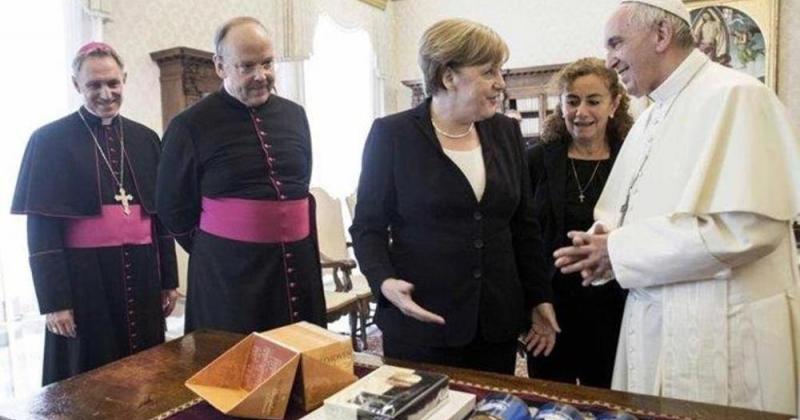Vatican reiterates its "No" to building new walls. Merkel, “Francis encouraged me to find global solutions”.
Pope Francis and Angela Merkel share the same aim to “bring down walls,” not build them, and agree on the importance of international treaties and commitment to Africa. This is what emerges from the encounter - a “cordial discussion”, as the Holy See defines it in a brief communique - between Pope Francis and German Chancellor Angela Merkel, received yesterday with her husband, Joachim Sauer in the Vatican apostolic Palace.
Issues of common interest such as fighting terrorism, poverty and hunger, with special regard for the upcoming G20 meeting in Hamburg, were addressed in the private audience that lasted about 40 minutes. Merkel thanked the Pontiff for receiving her once again- this was Chancellor Merkel’s fourth private audience out of the six overall meetings – and she described the encounter as “an honor and an opportunity”.
In addition to the common intent of “not building new walls and dismantling existing ones”, the upcoming G20 summit scheduled in Hamburg on 7 and 8 July was at the center of the dialogue. Germany, host country for the first time, sees it as an opportunity of a joint effort “for a multilateral world”. Then the African continent, especially the role of the European Union in trying to promote economic development. Finally, the Paris climate change accords, with Merkel’s regret - “Shade” “what a pity, Ed.” she said - for the US decision to leave COP 21. The Pope then expressed his condolences for the death of former German Chancellor Helmut Kohl, who passed away the day before, and whom he defined “a great statesman and committed European”.
The note outlined by the Vatican press room states that the parties “ agreed on the need to dedicate special attention to the responsibility of the international community in combating poverty and hunger, the global threat of terrorism, and climate change.” The meeting, Merkel noted, encouraged me “to seek to achieve, step by step, successes for the entire international community.”
An astonishing and revealing phrase. Astonishing because the chancellor has always rejected the “new leader of the free world” label that the Anglo-Saxon media has given to her. In recent days she reiterated, “No Country in the world and no person alone can solve the problems of the world”. However, these words also reveal the changing role of Germany, which is ever more that of a global power, even though Germany is inclined to “not see” itself as such. The Chancellor seems to “float” over the internal political debate, presenting herself as an anchor of stability in an messy world, she emerges more than ever as a global leader. Her horizon is international, it is Macron’s France, with whom she works to restart the EU; it is China, an increasingly important trading and strategic partner for Berlin; it is London after Brexit; Trump’s USA; Latin America, where she went just recently. And it is Africa, on which she is pursuing a historic change of strategy, giving up the traditional development aid policy, in favor of an approach that calls on African countries to take greater responsibility to improve on-site conditions so to activate more private investment and thus be able to trigger a more sustained growth and create more jobs.
A lesson learned over the past two years: Merkel is convinced that a situation like the one in 2015, when nearly one million refugees came to Germany, cannot repeat itself. To succeed, it is necessary to counteract the causes of migration in the countries of origin. Merkel’s leitmotiv throughout her visits to Mali, Niger, Ethiopia, Egypt and Tunisia over the past eight months. Fighting poverty and prospects of growth in Africa are Merkel’s goals and she knows she can count on Pope Francis’ support.
